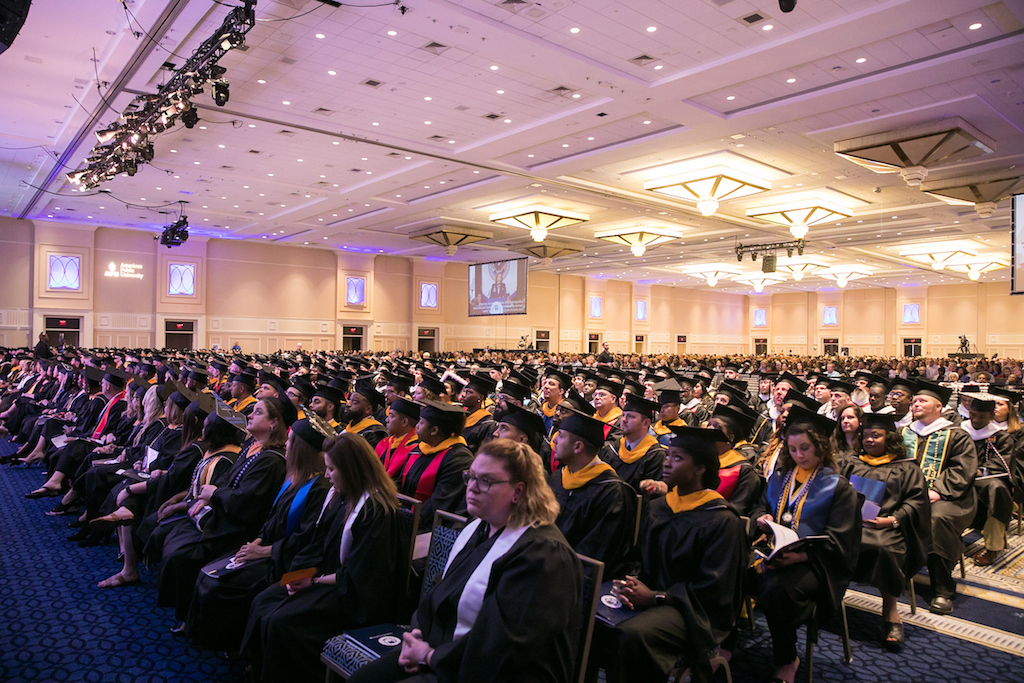After writing about the four Grand Challenges to higher education, I decided to write about how a digital university, APUS, has addressed some of these widespread concerns. Student success was the first widespread concern written about by Grajek and Brooks, and they further refined their definition in multiple subparts, which is helpful.
According to Grajek and Brooks, the key performance indicators (KPIs) of student success are persistence (remaining in school), retention (completing a course), and completion (earning a degree or credential). While I might suggest that retention has a broader academic research definition than merely completing a course and is more closely linked to persistence, I don’t disagree that these are important performance indicators.
Ernest Pascarella and Patrick Terenzini, noted researchers in the field of college student retention, wrote that students are retained as long as they make progress toward their personal or academic goal as aligned with the mission of the institution they attend. Based on their definition, the act of completing a degree or a credential may not be a student’s intended goal, but adding multiple KPIs to conform to every student’s goals would be difficult to track and manage.
APUS has always provided instruction at a distance to its students since its initial graduate courses offered in 1993. In the first few years, without a learning management system (LMS), courses were distributed by UPS and assignments were emailed as attachments or mailed to the course instructors. By 2000, all courses had been digitized and loaded into the LMS. It was then that the key performance indicators mentioned by EDUCAUSE as critical to student success could be reviewed, analyzed, and improved.
Course completion (retention, according to Grajek and Brooks) was and is important. There are many reasons why working adult students do not complete their courses. Work issues, family issues, and an inability to pay are three of the most frequently cited reasons by students for dropping or withdrawing from a course.
Early on, we recognized that working adults cannot always adhere to a traditional academic calendar of three or four semester starts a year. For that reason, we moved to monthly starts, and our students can count on courses starting year-round on the first Monday of each month.
While this strategy complicates predicting when students will take classes, it provides them with the flexibility to take courses when it fits their schedule and gives them a better chance of completing the course. We offer a free drop/add week at the beginning of each monthly start, and students know that if they do not enter their electronic classroom during Week 1 that they will be automatically dropped from the course for non-attendance. This policy also ensures that students do not have to complete one-fourth of the eight-week semester class assignments in Week 2 if they were unable to complete work in Week 1.
Immediate student access to course textbooks and other learning materials is another factor contributing to student success in our online courses. APUS has provided textbooks at no cost to our undergraduate students since 2001, investing over $149 million to make sure students have the books they need to get started immediately.
We expanded these savings to graduate students who are active-duty military servicemembers in 2020. For the students who have concerns about paying for courses, not having to pay for textbooks is another way to reduce the dropouts.
At APUS, we measure the persistence KPIs by monitoring a student’s status. All students are classified as active, program hold, disenrolled, or graduated. APUS students are classified as active for up to 12 months after completing their last course (assuming that they have not graduated).
After month 12 of inactivity, non-military students are disenrolled unless they have applied for a program hold. However, military students are automatically placed on a program hold due to their frequent deployments.
We have found over the years that keeping students engaged and active in their coursework is important to keeping them enrolled and on the path towards completing a certificate or graduating. For that reason, their academic advisors contact them periodically to see if they need any assistance in selecting future courses.
Our students have a personal academic plan that shows them which courses they have successfully completed and which courses have not been started. They can select a course that has not been started and see when it will be offered next. If they complete a course and have not enrolled for another course, advisors contact them regularly to assist with course registration recommendations.
Students who are placed on a program hold will not be disenrolled while they have that status and in fact, will retain their degree requirements based on their original enrollment date. This reduces the changes that students have to take additional courses to meet periodic changes in degree requirements.
Typically, students selecting a program hold are contacted once a year to check about their readiness to return to active status unless they connect with their academic advisor at APUS prior to the annual check-in. Students who are progressing and nearing graduation are contacted by their academic advisor when they are 75% complete and then again when they are 90% complete with their academic program.
The academic advisors make sure that the students are aware of the program requirements and the courses required for completion. All of these activities are tracked through our Student Information System, which is designed to provide automated reminders to the students. With a diverse population of more than 80,000 non-traditional students (meaning that they’re working full-time and taking classes part-time), APUS created a data warehouse to regularly review student progress toward completing their degrees or certificates as well as analyzing the data for ways in which to increase the percentages of students who complete their targeted program or certificate.
Grajek and Brooks also talk about engagement and outcomes as important issues related to student success. APUS researchers have been actively engaged over the years with a research community dedicated to improving online engagement between students and instructors called the Community of Inquiry (CoI). For many years, APUS utilized CoI-designed End of Course surveys to measure the level of engagement in its online classes and built continuing education courses in its Center for Teaching and Learning to share best practices for faculty in online course engagement.
While APUS’s operating model is totally online and all interactions between students, faculty, and staff are therefore digitized, outcomes measurement requires the installation of a framework whereby the student outcomes (grades) can be compared to course expectations as well as program expectations. For a number of years, the outcome standards applied to most programs were the proficiency profile exams developed and administered by the Educational Testing Service.
However, with the development of the Degree Qualifications Profile (DQP) thanks to funding by the Lumina Foundation, APUS adopted the DQP framework as its institutional learning outcomes objectives and has consistently mapped its course and program learning objectives with the tools provided by the DQP. With Industry Advisory Councils meeting with APUS faculty annually or more frequently, program requirements can be quickly changed using the DQP outcomes framework, thus assuring that students can have access to information relevant to the industries hiring graduates of those programs.
As an early pioneer of online education, APUS wisely decided to become an active participant in the Sloan Consortium, now the Online Learning Consortium (OLC). Funded originally by the Sloan Foundation, the OLC hosts annual conferences for its members and recognizes developments in technology that can improve online learning as well as best practices in teaching and learning online. APUS has received five Effective Practice Awards from the OLC recognizing innovations that its faculty and staff have implemented to make online learning more effective.
During the early years of online course and program offerings, the OLC was more often the place for faculty pioneers and institutional pioneers to go to share ideas as well as share experiences for what worked and what didn’t to assist students in learning better and teachers to teach more effectively. Institutions that want to embrace the digital transformation recommended by EDUCAUSE as the means by which to solve the Grand Challenges facing higher education need to understand that digital transformation is not just implementing new technology, but it’s embracing the use of that technology across the organization and changing some of the underlying framework in teaching in order to improve student success.











